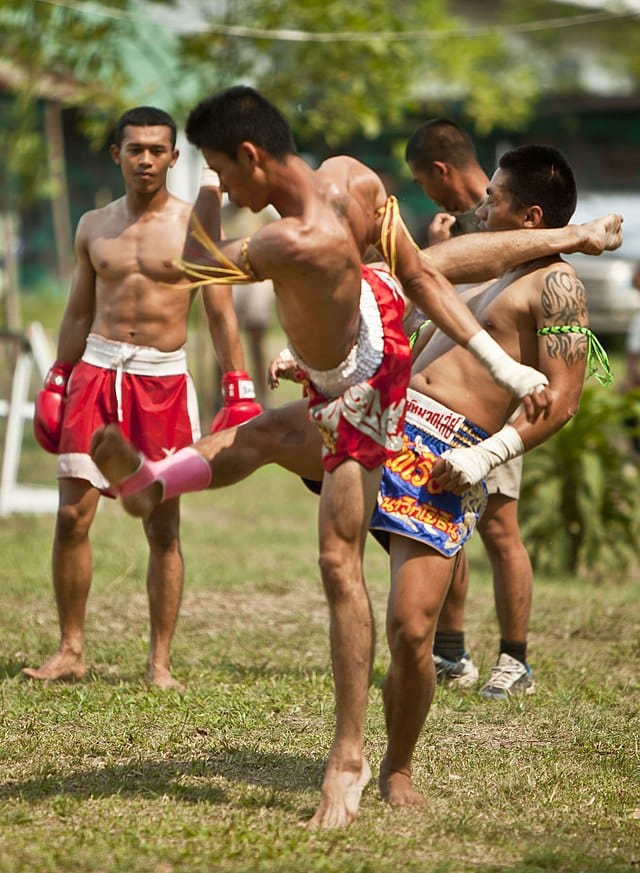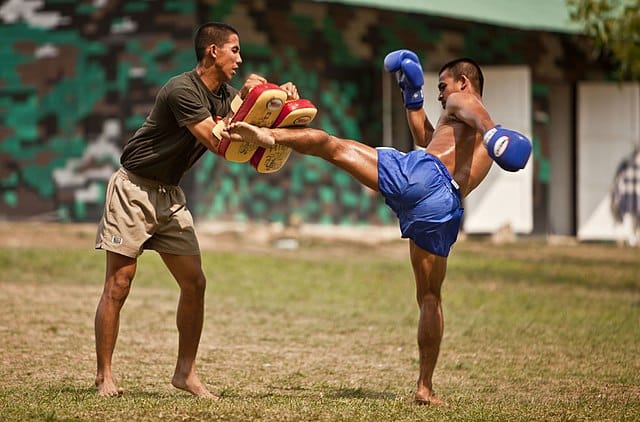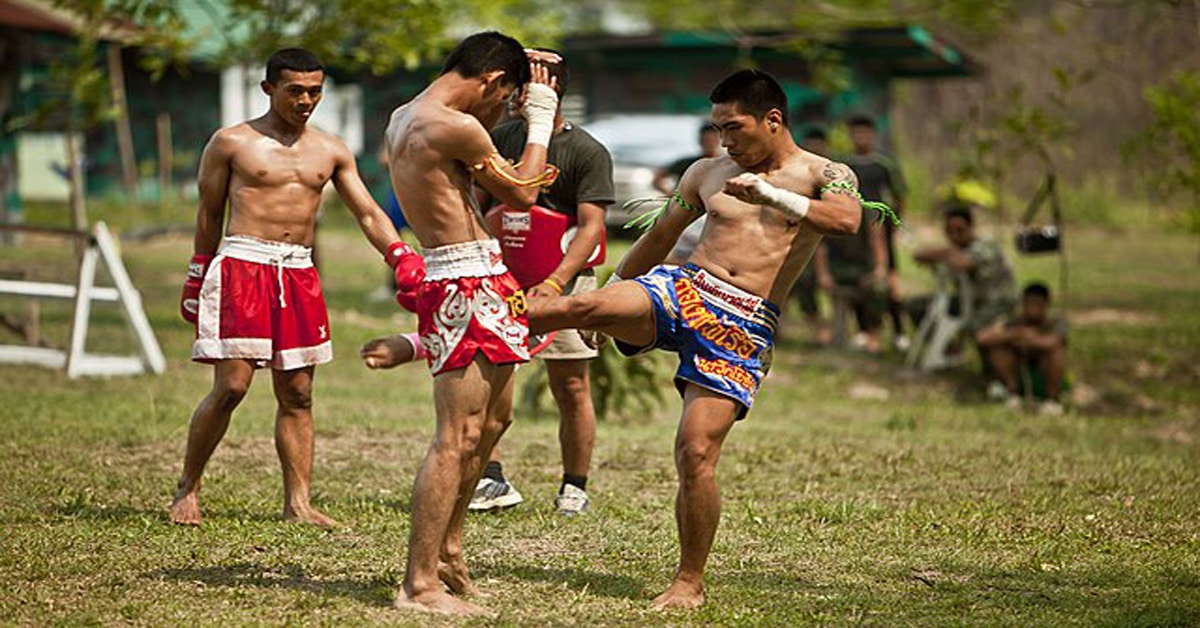Muay Thai Sparring
Muay Thai sparring may be the best type of sparring to improve your skills and conditioning. Thai boxing gyms developed it to condition their fighters and lessen their risk of injury.
Let’s go over all of the rules of Muay Thai sparring and what makes this training style so great.
What is Muay Thai Sparring?
Muay Thai sparring is a hybrid form of sparring that trainers in Thailand developed. A Muay Thai sparring session blends the best of light and hard sparring.
They are able to practice their technique at a fight pace to improve their conditioning and timing. This style of sparring has been shown to reduce the risk of injury while keeping fighters conditioned.
Almost all of the top pro-Thai boxers only do Muay Thai sparring in their training. It gives them the pace of a real fight with less chance of injury,
This form of sparring has prolonged the careers of many fighters like Buakaw and Saenchai.

What are the Styles of Sparring
To elaborate a little more on the styles of sparring, let’s go over them. There are two types of sparring, which are light and hard sparring.
Light sparring is a more technical style of sparring where you slow things down and work on technique. This is the best form of sparring for beginners who are still learning technique.
Hard sparring is basically a fight. Fighters get in the ring and go 100% at each other. Traditional Muay Thai gyms generally have etiquette where hard sparring is not allowed.
Hard sparring is more likely to hurt their fighters, which will sideline them and cause them to lose money. You will see hard sparring in Western and Japanese Muay Thai gyms as we’ve all watched online.
Why is Muay Thai Sparring Practiced
Muay Thai sparring is practiced for three main reasons. It replicates the pace of a fight while lowering the risk of injury and improving their technique.
Replicating Fight Pace
If you’ve ever seen two top prot Thai boxers, Muay Thai sparring, you’ll see it is intensely beautiful. The fighters will put on a blistering, steady pace while pulling their punches and focusing on their technique.
Generally, Thai boxers fight every month, meaning they must stay in fight shape. By being able to replicate the pace of the fight, it allows Thai boxers to stay ready to take a fight.
Lower Injury Risk
You’ve probably seen Spar Wars videos on YouTube, where boxers and kickboxers hard spar at 100%. In reality, they are really fighting and not sparring.
While this can make a fighter tough, it’s the worst thing they can do for their longevity. This is why Muay Thai sparring was created, as it allows fighters to go hard but pull back.
Training partners aren’t going for the KO or trying to hurt each other, which increases their longevity as fighters.
Improving Technique
The best way to test and improve your technique is by being put in live-action scenarios. Muay Thai sparring allows you to practice new techniques and set ups with resistance.

What are the Benefits of Muay Thai Sparring?
Muay Thai sparring is one of the best sparring methods that you can participate in. Here are some of the biggest benefits of Muay Thai sparring.
Improve Conditioning
Thai boxers can fight for so long without getting tired because of Muay Thai sparring. Their conditioning improves significantly since they don’t have to worry about getting hurt.
Improve Technique
The best way to improve your technique is to be put in a stressful situation where you’re forced to use it. It allows you to understand the speed, timing, and setups required to land different techniques.
By routinely doing rounds of Muay Thai sparring, your technique will improve rapidly.
Increase Longevity
The third reason why Muay Thai sparring is the preferred style of sparring in the sport is increased longevity. Statistically, fighters get their career shortened from injuries in training rather than in the fight.
If a pro fighter were only to do Muay Thai sparring, they would increase their career lengths. This is proven true as many fighters are now fighting well past their twenties.
The Rules of Muay Thai Sparring
There are certain unwritten rules of Muay Thai sparring that everyone follows. Remember these rules before you start sparring
Be Respectful
Students are to show respect to their teammates in sparring and not try to hurt them. You are there to help each other get better, and nobody benefits from either of you getting injured.
No Knockouts
Knockout or hurting your opponent is strictly forbidden in Muay Thai sparring. This type of sparring aims to create a fight pace and improve your conditioning. Going for the knockout or hurting teammates is a sign of disrespect.
Establish Power Level & Pace
When your sparring round begins, the first thing that you and your partner must do is establish power levels. This lets your partner know how hard you’re going to hit and what pace you’re going to go at.
Establishing this level with your partner is a good way to keep a steady pace without gradually increasing. You don’t want to have a round where you’re partner starts tagging you hard and things elevate to a fight.
Adjust to Partner’s Experience
When you’re sparring with someone, you must know your partner’s experience. If you have a higher experience than them, you don’t just shut them down and hit them at will.
You have to adjust to your partner to where they’re also getting work. That way, you’ll both get something out of the sparring.
Use Big Gloves
It’s a rule in many Muay Thai gyms that you’re only permitted to spar with big gloves. Boxing gloves that are at least 16 ounces.
Bigger gloves provide more cushion when you make contact with your teammate. Limiting the risk of injury, which happens more commonly with smaller gloves.
No Push Kicks to the Face
If you ever train in Thailand, you must remember never to push a kick to the face. In Thai culture, touching a fighter’s face with the bottom of your foot is disrespectful. Avoid push kicks to the face, so you don’t have to deal with an angry Thai fighter.
No Elbows
In Muay Thai sparring, elbows are strictly prohibited. Any cuts will cause a fighter to pull out of a fight, which will lose them money, and it’d be your fault.
Muay Thai gyms will only permit using elbows if you and your teammate wear elbow protectors.
Leg Sweep Rules
When you’re sparring, Muay Thai gyms have clear etiquette about throws and leg sweeps. You are not allowed to sweep your partner with 100% force.
If you catch a teammate’s kick, you are supposed to sweep them using technique and not force. They aren’t kicking with 100% force, which doesn’t give you the right to sweep the full force.
Keep Good Hygiene
If you’re going to partake in Muay Thai sparring, you have to keep good hygiene. Regularly bathe and cut your nails so you don’t cut your teammates.
Wai (Bow) or Dap Your Partner
It’s a custom to show respect to your partners before and after every round of sparring. Some gyms do the “wai” (type of bow) or just touch gloves. Remember to do either of these signs of respect between rounds.
What will Happen If You Test a Pro Thai Boxer
If, for some reason, you want to test your fortitude and hit a Thai boxer, just remember this. Anything that you throw at them will be answered with something even harder.
There have been numerous young and dumb Muay Thai students who have done this and paid the price. Don’t be this person; always respect your training partners.
Should I Start Muay Thai Sparring
If you are serious about improving your conditioning and technique, you should be doing Muay Thai sparring routinely. The best form of sparring will give you fight conditioning with the skills to match. It’s also really fun, and you’ll be hooked after your first round.


